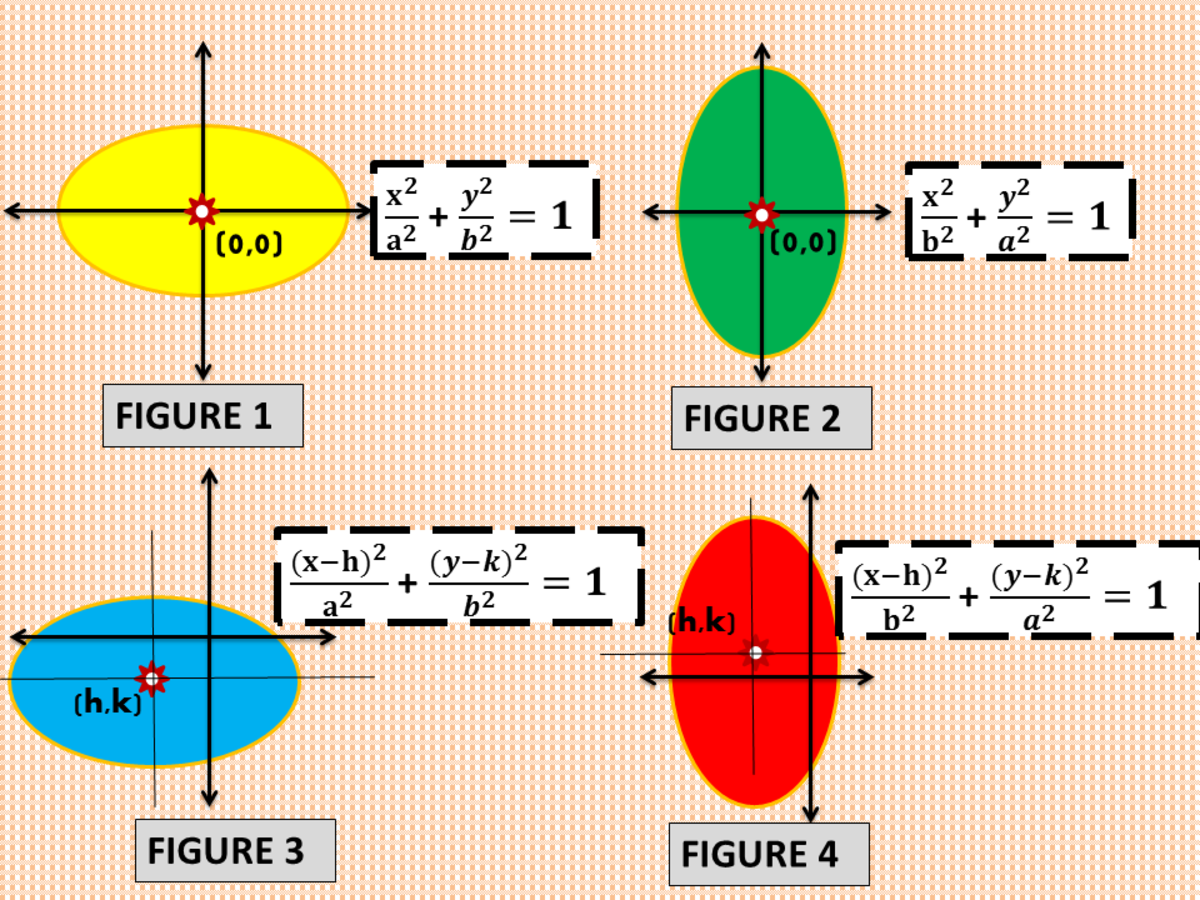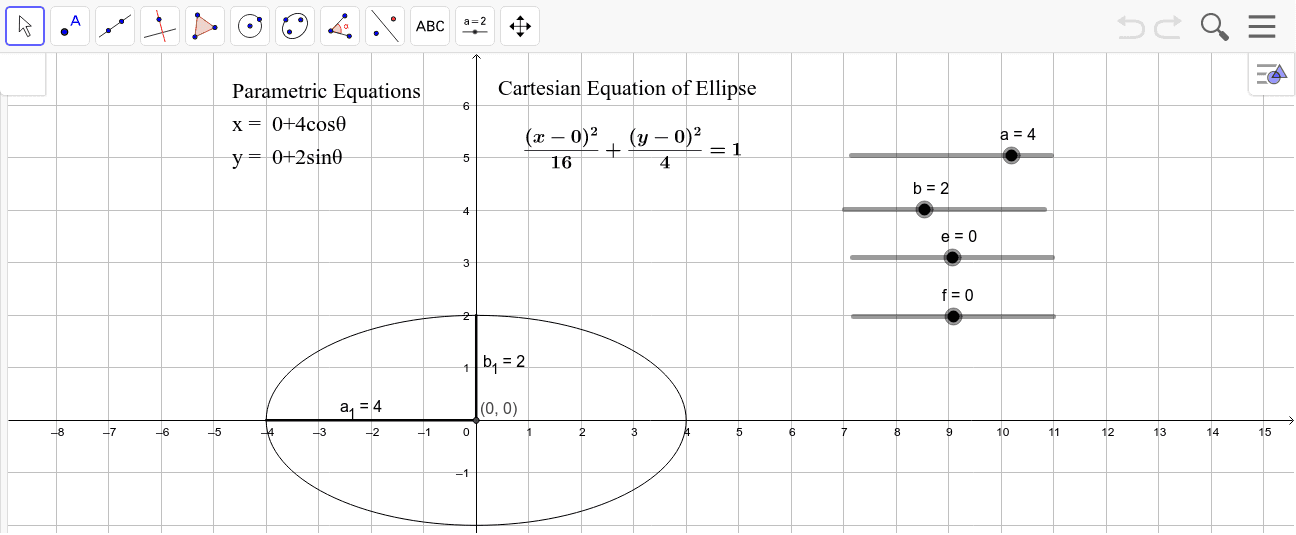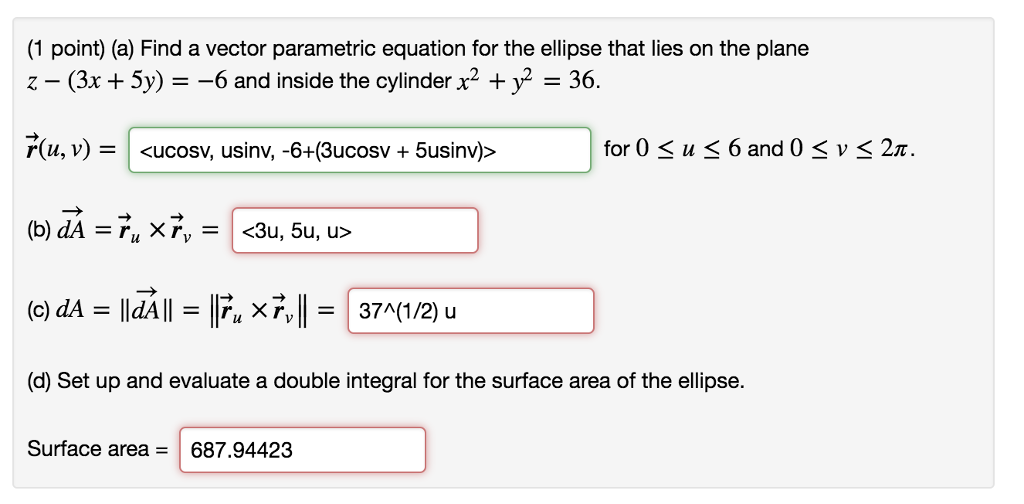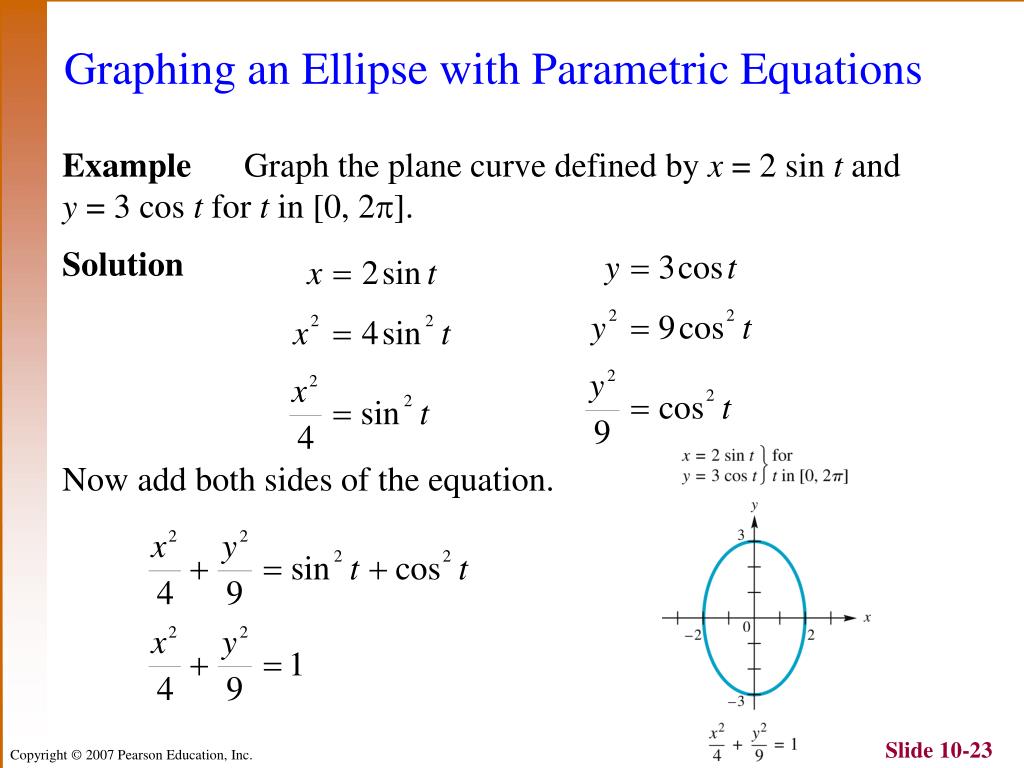
How to Graph an Ellipse Given an Equation Owlcation
Using the fact that sin2(x) +cos2(x) = 1. ⇒ x2 n2 + y2 m2 = 1. This is essentially an ellipse! Note that if you want a non-circle ellipse, you have to make sure that n ≠ m. Answer link. Here is one example. You can have (nsin (t),mcos (t)) when n!=m, and n and m do not equal to 1. This is essentially because: =>x=nsin (t) =>x^2=n^2sin.

calculus Extrema of ellipse from parametric form Mathematics Stack Exchange
1.3.1 Ellipse Parametric Equation. x ( t) = r cos ( θ) + h y ( t) = r sin ( θ) + k. The conic section most closely related to the circle is the ellipse. We have been reminded in class that the general equation of an ellipse is given by. x 2 a 2 + y 2 b 2 = 1.

Parametric Equation of an Ellipse (Hindi) YouTube
The standard form of the equation of an ellipse with center (0,0) ( 0, 0) and major axis parallel to the y -axis is. x2 b2 + y2 a2 =1 x 2 b 2 + y 2 a 2 = 1. where. a >b a > b. the length of the major axis is 2a 2 a. the coordinates of the vertices are (0,±a) ( 0, ± a) the length of the minor axis is 2b 2 b.

Normal of an Ellipse L9 Three Equations 1 Parametric form 2 Point form 3 Slope form YouTube
Solution: The equation of the ellipse is: The general equation of ellipse is: On comparison: Hence: The length of the major axis = 2a =8. The length of the minor axis = 2b = 6. Example 2: The length of the semi-major and semi-minor axis of an ellipse is 4 cm and 2 cm respectively.

Parametric Equations of Ellipse Example 3 椭圆参数方程 YouTube
The parametric equations limit \(x\) to values in \((0,1]\), thus to produce the same graph we should limit the domain of \(y=1-x\) to the same.. This final equation should look familiar -- it is the equation of an ellipse! Figure 9.26 plots the parametric equations, demonstrating that the graph is indeed of an ellipse with a horizontal.

Parametric Equation of Ellipse YouTube
Since the parametric equation is only defined for \(t > 0\), this Cartesian equation is equivalent to the parametric equation on the corresponding domain.. This is a Cartesian equation for the ellipse we graphed earlier. Parameterizing Curves. While converting from parametric form to Cartesian can be useful, it is often more useful to.

Finding Area of an Ellipse by using Parametric Equations YouTube
An ellipse is the locus of a point whose sum of the distances from two fixed points is a constant value. The two fixed points are called the foci of the ellipse, and the equation of the ellipse is x2 a2 + y2 b2 = 1 x 2 a 2 + y 2 b 2 = 1. Here. a is called the semi-major axis.

Ellipse Equations GeoGebra
An ellipse (red) obtained as the intersection of a cone with an inclined plane. Ellipse: notations Ellipses: examples with increasing eccentricity. In mathematics, an ellipse is a plane curve surrounding two focal points, such that for all points on the curve, the sum of the two distances to the focal points is a constant.It generalizes a circle, which is the special type of ellipse in which.

5.8B Parametric Equations for Ellipses Part 1 YouTube
This video is a part of the Ellipse playlist: https://www.youtube.com/playlist?list=PLLLfkE_CWWawCB50B0g3ooPIIY72kDAQSSee more about ellipse: https://math-st.

Writing Equations of Ellipses In Standard Form and Graphing Ellipses Conic Sections YouTube
Parametric equation of ellipse. By Martin McBride, 2020-09-14 Tags: ellipse major axis minor axis Categories: coordinate systems pure mathematics. The parametric equation of an ellipse is: $$ \begin{align} x = a \cos{t}\newline y = b \sin{t} \end{align} $$ Understanding the equations.

Solved Find a vector parametric equation for the ellipse
Parametric form. In parametric form, the equation of an ellipse with center (h, k), major axis of length 2a, and minor axis of length 2b, where a > b and θ is an angle in standard position can be written using one of the following sets of parametric equations. when the major axis is horizontal. x = h + a·cos(θ), y = k + b·sin(θ)

PPT Parametric Equations PowerPoint Presentation, free download ID6311823
The parametric equation of an ellipse centered at \((0,0)\) is \[f(t) = a\cos t, \quad g(t) = b\sin t.\] Our approach is to only consider the upper half, then multiply it by two to get the area of the entire ellipse. First, we need to find the left and right bounds in terms of \(t\), such that

S 2.26 Parametric Equation of Ellipse How to Find Parametric Equation of Ellipse? YouTube
x = a cos ty = b sin t. t is the parameter, which ranges from 0 to 2π radians. This equation is very similar to the one used to define a circle, and much of the discussion is omitted here to avoid duplication. See Parametric equation of a circle as an introduction to this topic. The only difference between the circle and the ellipse is that in.

Integration Application Area Using Parametric Equations Ellipse YouTube
Given the ellipse. x2 a2 + y2 b2 = 1 x 2 a 2 + y 2 b 2 = 1. a set of parametric equations for it would be, x =acost y =bsint x = a cos t y = b sin t. This set of parametric equations will trace out the ellipse starting at the point (a,0) ( a, 0) and will trace in a counter-clockwise direction and will trace out exactly once in the range 0 ≤ t.

Ex Find Parametric Equations For Ellipse Using Sine And Cosine From a Graph YouTube
Now from P draw PM perpendicular to the major axis of the ellipse and produced MP cuts the auxiliary circle x2 2 + y2 2 = a2 2 at Q. Join the point C and Q. Again, let ∠XCQ = ф. The angle ∠XCQ = ф is called the eccentric angle of the point P on the ellipse. The major axis of the ellipse x2 a2 x 2 a 2 + y2 b2 y 2 b 2 = 1 is AA' and its.

Parametric equation Q No 1 Equation of Ellipse YouTube
An ellipse is a curve that is the locus of all points in the plane the sum of whose distances r_1 and r_2 from two fixed points F_1 and F_2 (the foci) separated by a distance of 2c is a given positive constant 2a (Hilbert and Cohn-Vossen 1999, p. 2). This results in the two-center bipolar coordinate equation r_1+r_2=2a, (1) where a is the semimajor axis and the origin of the coordinate system.